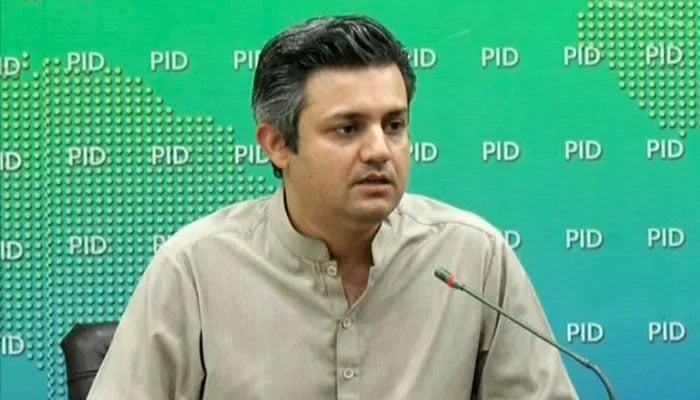Gas suspension: APTMA’s claim of losing $250m exports untrue, says Hammad
ISLAMABAD: Hammad Azhar, Federal Minister for Energy, here on Sunday said that APTMA’s claim of losing $250 million textile export, because of the gas closure for 15 days, carries no weight, saying that gas supply was curtailed for captive power plants only, not for cloth making process. He referred to some facts which speak otherwise, saying that APTMA members had taken a court stay against the cabinet-notified tariff of gas at $9 per MMBTU for captive plants, which prompted the Energy Ministry to halt gas supply to captive power plants.
He said that more than 90pc of the mills have power connections with the national grid. The government offered 9 cents per unit tariff to the textile sector, which is at par with the regionally-competitive rate. And more than 90 percent textile mills shifted immediately to the grid, so there is no production loss at all.
However, the minister said that gas to captive plants was resumed on December 29 when APTMA members agreed to vacate the court stays and okayed energy audits of their captive plants. Since December 29, only 50pc have come forward to restore connections for their captive plants and the rest are still running their mills on the national grid.
"Out of 75mmcfd allocated to textile, only 55mmcfd are being used because the rest have not given affidavits and running mills on the national grid at 9 cents.”
When asked about 44 textile mills which are getting electricity from the national grid full of interruptions causing production loss, the minister said that 94 percent of the whole industry in Pakistan, which also includes cement and glass industry, gets electricity from the national grid and they never complained of interruptions. The minister said factually, APTMA people want the RLNG at $6.5 per MMBTU, which is at $40 per MMBTU in the spot market.
The story, which appeared on January 08, 2022 in The News with the headline 'Gas suspension: Pakistan loses textile exports worth $250m' is based on the working done by APTMA and verified by its executive director. However, this correspondent tried to contact Hammad Azhar, Energy Minister, for his version but he was busy in Faisalabad and he did not reply.
The Energy Ministry says that APTMA’s claim of loss of $250 million due to gas disconnection is completely flawed. As per data released by Pakistan Bureau of Statistics, Pakistan’s December exports came in at US$2.74 billion compared to $2.36 billion in December 2020, up 17pc. The average exports per month in July to December, 2022 were $2.5 billion. December exports were $250 million dollars higher than the average exports of the last six months. The question is from where this figure of loss of $250 million in exports came from?
The APTMA’s executive director says that the textile sector thrives on electricity with no interruptions generated by efficient captive power plants. Nonetheless, when the gas supply was halted for 15 days, their production got impacted severely and the textile sector in Punjab lost textile exports of $250 million during the 15-day period. He says that in case the gas supply had not been disconnected, then exports would have gone up to $2.99 billion instead of $2.74 billion in December.
Shahid Sattar claimed that textile mills in Punjab are not getting smooth supply of electricity from the national grid due to interruptions, causing huge losses to the industry, which may go up to $250-400 million per month.
He said APTMA wrote a letter on January 7 to Razak Dawood, Adviser to PM on Commerce and Textile, based on data from January 1 to January 05 about fluctuations in electricity being provided to 44 textile mills. He said each interruption causes waste of half an hour and up to two hours in restarting the machinery, resulting in losing material and rendering capacity grossly underutilized, the letter said. It said that mills are currently running on 80 percent capacity, which signifies 20 percent loss of exports. And this adds up to losses between $250-$400 million in exports lost every month. He also mentioned that new machinery installed in many mills under new investments was burnt due to sudden surge in voltages.
However, the Energy Ministry says that the government policy has been and continues to be that indigenous gas resources are limited and depleting and the national requirement is being met through expensive imports. This resource must be used in the most efficient way possible. While the government-owned RLNG based plants operate at an efficiency level well above 60pc, the textile industry’s captive units should come close to this level of efficiency in electricity generation. The government is willing to consider the combined efficiency of captive and process units. In order to determine their efficiency, the textile industry must submit to efficiency audits and not prevent such audits through court stays. Textile industry and the government have now agreed that such audits will be conducted before 30th June, 2022.
Given the competitiveness concern, the Pakistan textile sector is still getting competitive power and gas when compared to peers, beside the cheap labour, and tariff and tax concessions and above all cheap financing for working and long-term fixed capital.
-
 NASA Celebrates One Year Of Trump’s Second Term With Moon And Mars Achievements
NASA Celebrates One Year Of Trump’s Second Term With Moon And Mars Achievements -
 Chris Pratt Shares Real Thoughts On AI In Film Industry
Chris Pratt Shares Real Thoughts On AI In Film Industry -
 Netflix Disappointed As Meghan Markle’s Series Struggles To Impress
Netflix Disappointed As Meghan Markle’s Series Struggles To Impress -
 Royal Family Announces Death Of Princess: King Releases Statement
Royal Family Announces Death Of Princess: King Releases Statement -
 Sarah Ferguson Will Continue To Be Part Of Andrew's Life
Sarah Ferguson Will Continue To Be Part Of Andrew's Life -
 Google’s Gemini Now Offers Free SAT Prep With Full-length Mock Tests
Google’s Gemini Now Offers Free SAT Prep With Full-length Mock Tests -
 Everything You Need To Know About Macron’s Viral Glasses: Cost, Model, All Details Revealed
Everything You Need To Know About Macron’s Viral Glasses: Cost, Model, All Details Revealed -
 Elon Musk Warns Of AI ‘supersonic Tsunami’: What It Means For Future
Elon Musk Warns Of AI ‘supersonic Tsunami’: What It Means For Future -
 Why Victoria Beckham's Dance Video From Brooklyn's Wedding Won't Be Released
Why Victoria Beckham's Dance Video From Brooklyn's Wedding Won't Be Released -
 Prince Harry No Longer Focused On Healing Royal Family Feud?
Prince Harry No Longer Focused On Healing Royal Family Feud? -
 OpenAI Aims To Make AI A Daily Global Tool
OpenAI Aims To Make AI A Daily Global Tool -
 Will Andrew Receive Any Royal Treatment After Title, Royal Lodge Removal?
Will Andrew Receive Any Royal Treatment After Title, Royal Lodge Removal? -
 How Your Body 'suffers' In Back Pain And Simple Way To Fix It
How Your Body 'suffers' In Back Pain And Simple Way To Fix It -
 What Victoria Beckham Really Did At Brooklyn, Nicola’s Wedding Revealed
What Victoria Beckham Really Did At Brooklyn, Nicola’s Wedding Revealed -
 Send Your Name To Moon With Nasa’s Artemis Mission: Here’s How
Send Your Name To Moon With Nasa’s Artemis Mission: Here’s How -
 Zhipu AI, MiniMax Debuts Mask Structural Hurdles For China’s Tech Giants
Zhipu AI, MiniMax Debuts Mask Structural Hurdles For China’s Tech Giants




